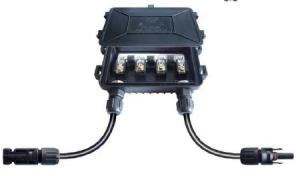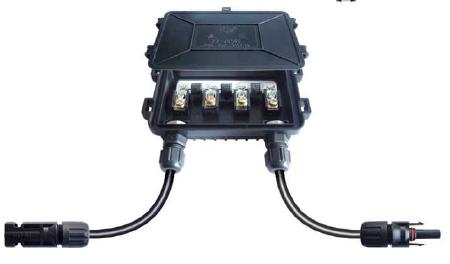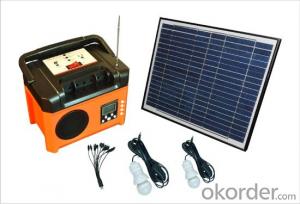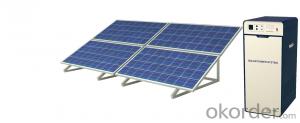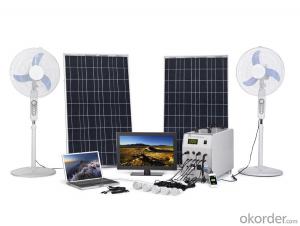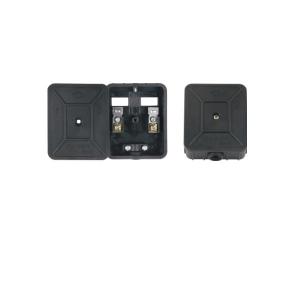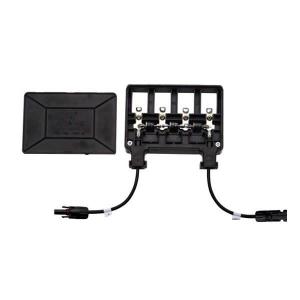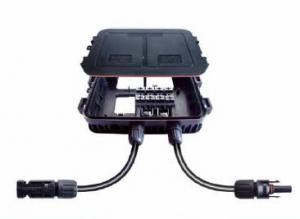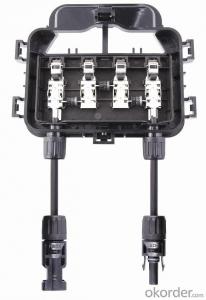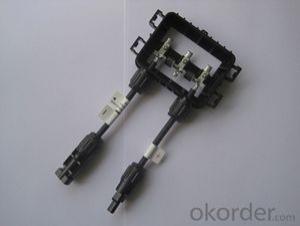Solar Junction box PV-JB080
- Loading Port:
- China Main Port
- Payment Terms:
- TT OR LC
- Min Order Qty:
- -
- Supply Capability:
- 10000 set/month
OKorder Service Pledge
OKorder Financial Service
You Might Also Like
Solar Junction box,Due to highly robustness,UV-resistance,the touch protection a high grade connection is guaranteed for many years.
Rated voltage 1000 V
Rated current 16A
Contact resistance ≤5mΩ
Dia of pin or socket 3mm /4mm
Protection degree(mated,junction box closed/unmated) IP65/IP2X
Operating temperature -40 C to +85C
Insulation material PPO
Contact material Copper,silver plated
- Q: Can solar energy systems be used for powering electric vehicle solar charging canopies?
- Indeed, electric vehicle solar charging canopies can rely on solar energy systems for power. By incorporating solar panels into the canopy structure, sunlight can be captured and transformed into electrical energy. Consequently, this energy can be employed to charge the batteries of electric vehicles parked beneath the canopy. Thus, this arrangement not only utilizes the sun's clean and sustainable energy but also offers a practical and eco-friendly solution for charging electric vehicles. Moreover, any surplus energy produced by the solar panels can be stored in batteries or redirected to the grid, further amplifying the environmental advantages of this system.
- Q: Can solar energy systems be used in powering theme parks or water parks?
- Yes, solar energy systems can definitely be used to power theme parks or water parks. Solar energy is a clean and renewable source of power that can provide a sustainable and cost-effective solution for meeting the energy needs of these establishments. Theme parks and water parks require a significant amount of electricity to operate attractions, lighting, water pumps, and other facilities. Installing solar panels can help reduce their reliance on conventional energy sources and decrease their carbon footprint. The large open spaces available in theme parks and water parks are ideal for installing solar panels, which can be mounted on rooftops, carports, or ground-mounted arrays. Solar energy systems can generate electricity by converting sunlight into usable energy through photovoltaic (PV) panels. These panels can be integrated into the infrastructure of the park discreetly and efficiently. The energy generated during the day can be used immediately to power rides, lighting, and other equipment, and any excess energy can be stored in batteries for use during periods of low sunlight or at night. Furthermore, solar energy systems can provide a reliable source of power and reduce the vulnerability of theme parks and water parks to power outages or disruptions in the grid. This is particularly important in areas prone to extreme weather events. By incorporating backup battery storage systems, solar energy can provide a constant and uninterrupted power supply even during emergencies. In addition to the environmental and reliability benefits, solar energy systems can also provide long-term cost savings for theme parks and water parks. While the initial installation cost might be higher, the operational costs are significantly reduced as the sun provides free and abundant energy. Over time, the savings on electricity bills can offset the initial investment, resulting in substantial cost savings for the park's owners. Overall, solar energy systems have the potential to revolutionize the power supply of theme parks and water parks. By harnessing the sun's energy, these establishments can not only reduce their environmental impact but also achieve long-term cost savings and enhanced energy reliability.
- Q: Can solar energy systems be used for powering amusement parks or entertainment venues?
- Yes, solar energy systems can be used for powering amusement parks or entertainment venues. Solar power has emerged as a viable and sustainable alternative to traditional energy sources, providing numerous benefits for large-scale operations like amusement parks. Amusement parks and entertainment venues consume a significant amount of energy, especially during peak operating hours. By installing solar panels, these venues can generate clean and renewable energy on-site, reducing their dependence on fossil fuels and lowering their carbon footprint. This not only helps in combating climate change but also promotes environmental stewardship and sustainability. Solar energy systems can be designed to meet the specific energy needs of amusement parks. The expansive roofs of buildings, parking lots, and other open spaces can be utilized to install solar panels, maximizing the energy generation potential. Additionally, advancements in solar technology such as thin-film solar panels and solar canopies offer innovative solutions to integrate solar power seamlessly into the park's infrastructure. One of the key advantages of solar power is its ability to generate electricity during peak demand periods, which often align with the peak operating hours of amusement parks. This ensures a reliable and consistent power supply, preventing disruptions and ensuring a smooth and enjoyable experience for visitors. Furthermore, solar energy systems can also be coupled with battery storage solutions. Excess energy generated during the daytime can be stored in batteries and utilized during the evening or on cloudy days, ensuring uninterrupted power supply even when the sun is not shining. This enhances the reliability and resilience of the park's energy infrastructure. In addition to the environmental and operational benefits, solar energy systems can also provide cost savings in the long run. While the initial investment may be higher, the ongoing operational costs are significantly lower compared to traditional energy sources. The savings generated from reduced electricity bills can be reinvested into improving park infrastructure, enhancing visitor experiences, and expanding attractions. Amusement parks and entertainment venues have a unique opportunity to showcase their commitment to sustainability and renewable energy by adopting solar power systems. By harnessing the power of the sun, these venues can not only reduce their environmental impact but also inspire visitors to make more sustainable choices in their own lives. In conclusion, solar energy systems can indeed be utilized to power amusement parks and entertainment venues. The numerous benefits, including environmental sustainability, reliable power supply, cost savings, and the opportunity to promote renewable energy, make solar power an excellent choice for powering these large-scale operations.
- Q: How does the angle of a solar panel affect its performance in different seasons?
- The angle of a solar panel significantly affects its performance in different seasons. In summer, when the sun is higher in the sky, it is best to tilt the solar panel at a steeper angle to maximize sunlight absorption. This allows the panel to capture more direct sunlight and generate more electricity. In contrast, during winter when the sun is lower, it is optimal to tilt the solar panel at a shallower angle to accommodate for the lower sun angle. Adjusting the angle of the solar panel according to the season helps optimize its performance and ensures maximum energy production throughout the year.
- Q: What are the different applications of solar energy systems in transportation?
- Transportation can benefit greatly from the utilization of solar energy systems in various ways. By incorporating solar panels onto vehicles such as electric cars, carbon emissions and reliance on fossil fuels can be reduced. This not only extends the driving range of electric vehicles but also lessens the need for charging from the electrical grid. Furthermore, solar energy can be harnessed in charging stations specifically designed for electric vehicles. These stations can be equipped with solar panels, allowing them to generate clean electricity for charging purposes. This shift away from non-renewable energy sources contributes to the establishment of a more sustainable transportation system. Another avenue for solar energy systems in transportation is seen in public transportation. By implementing solar-powered buses and trains, cities can offer emission-free transportation options, thereby decreasing air pollution and enhancing air quality. Solar panels installed on the roofs of these vehicles can additionally power various onboard systems, including lighting, air conditioning, and information displays, further minimizing energy consumption. In addition to electric vehicles and public transportation, solar energy systems can also be integrated into other modes of transportation like bicycles and boats. By incorporating solar panels into the design of these vehicles, electricity can be generated to power electric motors or charge batteries. This advancement makes these transportation options more energy-efficient and environmentally friendly. In summary, the applications of solar energy systems in transportation are vast and hold immense potential for reducing greenhouse gas emissions while simultaneously promoting sustainable transportation options. By harnessing the power of the sun, we can create a future for transportation that is cleaner and more environmentally friendly.
- Q: What is the impact of temperature on the performance of solar panels?
- Solar panel performance is primarily negatively impacted by temperature, although there are factors that can lessen these effects. Generally, as temperature rises, solar panel efficiency decreases. This is due to the semiconductors in the panels becoming less effective at converting sunlight into electricity as they heat up. One of the main reasons for this efficiency decrease is the correlation between temperature and solar panel voltage output. As temperature increases, voltage output decreases, resulting in a reduction in power output. This phenomenon is referred to as the solar panel's temperature coefficient, which varies depending on the panel's type and quality. Moreover, increased temperature can cause thermal expansion and contraction, placing stress on the electrical connections and components within the panel. This can lead to the panel's performance degradation over time. Nevertheless, it is important to note that not all aspects of solar panel performance are negatively impacted by temperature. In fact, higher temperatures can enhance the conductivity of the electrical connections, potentially improving the panel's overall performance. Additionally, some panels are designed with cooling mechanisms, such as air or water circulation, to maintain their temperature and mitigate the negative effects. In conclusion, temperature predominantly has a negative impact on solar panel performance, resulting in reduced efficiency and power output. However, with appropriate design and cooling mechanisms, these effects can be mitigated to some extent, enabling solar panels to continue generating electricity even in high-temperature environments.
- Q: How do solar energy systems contribute to reducing the risk of power outages during extreme weather events?
- Solar energy systems contribute to reducing the risk of power outages during extreme weather events by providing a decentralized and reliable source of electricity. Unlike traditional power grids that are vulnerable to damage from storms, solar energy systems operate independently and can continue generating power even if the main grid goes down. This means that even during severe weather events, such as hurricanes or snowstorms, solar panels can still supply electricity to homes, businesses, and critical infrastructure, reducing the reliance on centralized power sources and minimizing the impact of power outages.
- Q: Can solar energy systems be used in areas with limited access to the grid?
- Yes, solar energy systems can be used in areas with limited access to the grid. In fact, solar energy is particularly well-suited for such areas as it provides a decentralized and independent source of power. By installing solar panels and utilizing batteries, communities and individuals can generate and store their own electricity, reducing their reliance on the grid. This makes solar energy an excellent solution for remote locations, developing countries, and areas prone to grid outages or disruptions.
- Q: How does the efficiency of solar panels degrade over time?
- The efficiency of solar panels degrades over time due to various factors such as exposure to sunlight, temperature fluctuations, and the natural wear and tear. This degradation is primarily caused by the gradual degradation of the solar cells themselves, which can experience a decrease in their ability to convert sunlight into electricity. Additionally, environmental factors like dust accumulation and shading can also contribute to the decline in efficiency. Regular maintenance and cleaning can help mitigate some of these effects, but it's important to note that solar panels will still experience a gradual decrease in efficiency over their lifespan.
- Q: Can a solar energy system be used to heat water?
- Certainly! A solar energy system has the capability to warm water. Solar water heaters utilize the energy from the sun to heat water for a multitude of purposes, including household usage, swimming pools, and industrial operations. These systems usually comprise solar collectors that absorb the sun's radiation and transmit the heat to a fluid. This fluid is subsequently circulated to warm the water contained in a tank. Solar water heaters are highly efficient, economical, and eco-friendly substitutes for conventional water heating techniques. They have the potential to substantially decrease energy expenses and emissions of greenhouse gases, all while ensuring a consistent supply of hot water throughout the year.
Send your message to us
Solar Junction box PV-JB080
- Loading Port:
- China Main Port
- Payment Terms:
- TT OR LC
- Min Order Qty:
- -
- Supply Capability:
- 10000 set/month
OKorder Service Pledge
OKorder Financial Service
Similar products
Hot products
Hot Searches
Related keywords
